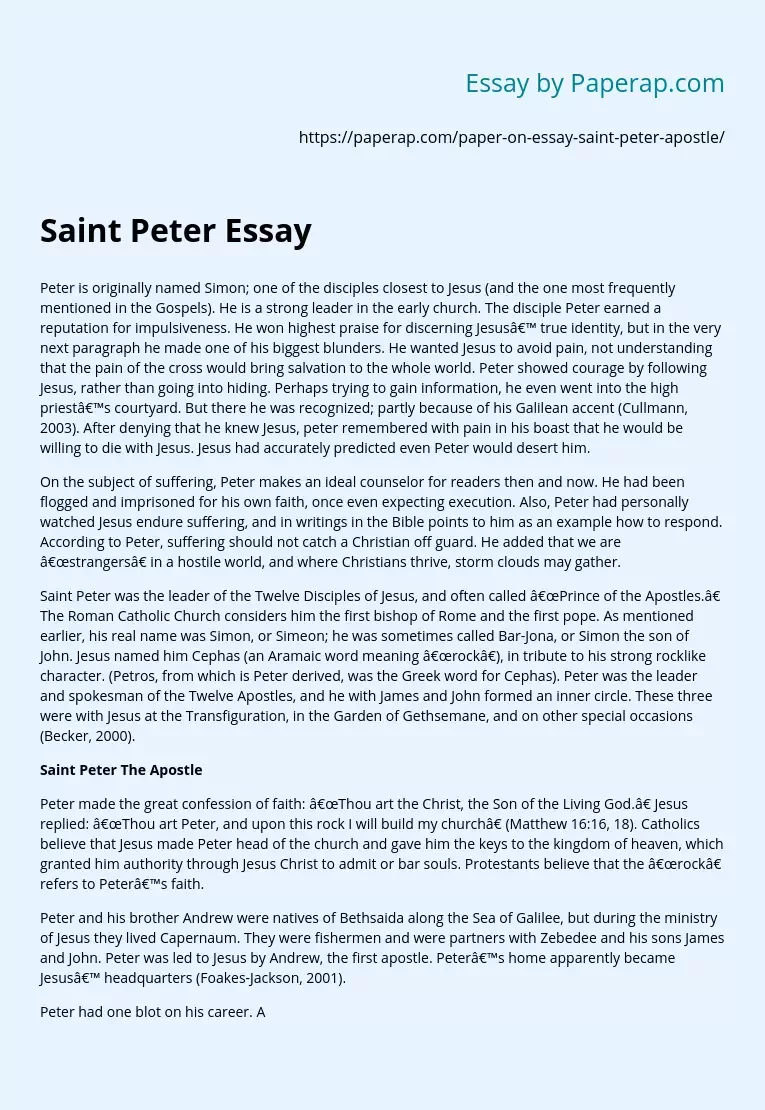Saint Peter The Apostle Life and Religious Career
Peter is originally named Simon; one of the disciples closest to Jesus (and the one most frequently mentioned in the Gospels). He is a strong leader in the early church. The disciple Peter earned a reputation for impulsiveness. He won highest praise for discerning Jesus’ true identity, but in the very next paragraph he made one of his biggest blunders. He wanted Jesus to avoid pain, not understanding that the pain of the cross would bring salvation to the whole world.
Peter showed courage by following Jesus, rather than going into hiding. Perhaps trying to gain information, he even went into the high priest’s courtyard. But there he was recognized; partly because of his Galilean accent (Cullmann, 2003). After denying that he knew Jesus, peter remembered with pain in his boast that he would be willing to die with Jesus. Jesus had accurately predicted even Peter would desert him.
On the subject of suffering, Peter makes an ideal counselor for readers then and now.
He had been flogged and imprisoned for his own faith, once even expecting execution. Also, Peter had personally watched Jesus endure suffering, and in writings in the Bible points to him as an example how to respond. According to Peter, suffering should not catch a Christian off guard. He added that we are “strangers” in a hostile world, and where Christians thrive, storm clouds may gather.
Saint Peter was the leader of the Twelve Disciples of Jesus, and often called “Prince of the Apostles.” The Roman Catholic Church considers him the first bishop of Rome and the first pope.
As mentioned earlier, his real name was Simon, or Simeon; he was sometimes called Bar-Jona, or Simon the son of John. Jesus named him Cephas (an Aramaic word meaning “rock”), in tribute to his strong rocklike character. (Petros, from which is Peter derived, was the Greek word for Cephas). Peter was the leader and spokesman of the Twelve Apostles, and he with James and John formed an inner circle. These three were with Jesus at the Transfiguration, in the Garden of Gethsemane, and on other special occasions (Becker, 2000).
Saint Peter The Apostle’s Biography
Peter made the great confession of faith: “Thou art the Christ, the Son of the Living God.” Jesus replied: “Thou art Peter, and upon this rock I will build my church” (Matthew 16:16, 18). Catholics believe that Jesus made Peter head of the church and gave him the keys to the kingdom of heaven, which granted him authority through Jesus Christ to admit or bar souls. Protestants believe that the “rock” refers to Peter’s faith.
Peter and his brother Andrew were natives of Bethsaida along the Sea of Galilee, but during the ministry of Jesus they lived Capernaum. They were fishermen and were partners with Zebedee and his sons James and John. Peter was led to Jesus by Andrew, the first apostle. Peter’s home apparently became Jesus’ headquarters (Foakes-Jackson, 2001).
Peter had one blot on his career. After the arrest of Jesus, he denied three times that he knew his master, a sin for which he grievously repented. After the Resurrection, Christ gave Peter a commission to feed his sheep, that is, to give pastoral care to his church in Jerusalem. On the day of Pentecost, his preaching won about 3,000 converts. Peter continued his preaching in spite of persecution. He was the first to baptize Gentiles, but later after strong criticism he withdrew from association with Gentile Christians, a retreat that drew a sharp rebuke from Paul.
About 43 A.D. after imprisonment by Herod Agrippa I, Peter left Jerusalem (Acts 12:170. He apparently became a missionary to the Jews, and suffered martyrdom under Nero in Rome, supposedly at Vatican Hill. According to Catholic tradition, peter became bishop of the Church of Rome. He met death by crucifixion (Cullmann, 2003). He is said to have been crucified with his head downward at his request. Peter is credited with the authorship of two epistles. The Roman Catholics celebrate Peter’s fest day every 29th of June.
Peter is a representation of a Christian who commits mistakes but willingly repented in order to be reconciled to his master. He is very aggressive and quick in his actions yet ready to humble down. He has also a teachable heart and a character that is ready to be taught and nurtured by the teachings of Christ. Though at first, Peter failed to defend his faith by denying Christ but in the long run, after his repentance and received forgiveness from the Lord, he was very bold in proclaiming the gospel even though he was persecuted and cost his life. His passion in serving God is rekindled because of God’s kindness and love that was shown to him during the time Peter failed God.
Saint Peter The Apostle Life and Religious Career. (2019, Dec 05). Retrieved from https://paperap.com/paper-on-essay-saint-peter-apostle/

